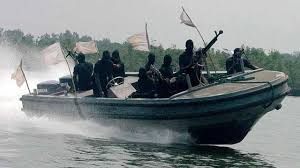Maritime industry stakeholders have raised concerns over the high cost of marine security in Nigeria, revealing that shipowners still spend between $5,000 and $8,000 daily to hire private security vessels, despite government claims of zero piracy attacks in recent years.
The revelation comes shortly after the Minister of Marine and Blue Economy, Adegboyega Oyetola, announced that Nigeria had recorded zero pirate attacks in its territorial waters over the past three years. Oyetola made the announcement in Lagos during a one-day stakeholders’ engagement session, where he also disclosed the Federal Government’s plans to revive fishing terminals to boost local seafood production.
However, industry experts have countered the claim of improved security with real-time operational challenges that continue to place a heavy financial burden on shipowners operating within Nigerian waters.
Speaking on the issue, the Deputy National President of the Nigerian Association of Master Mariners, Captain Jide Olguwa, stated that shipowners still rely on security escort vessels to accompany their ships — even within the country’s territorial waters — and that these services come at a significant cost.
According to Capt. Olguwa, the continued reliance on security escorts indicates underlying security risks in Nigeria’s maritime space that need to be addressed. He noted that the Nigerian Navy is constitutionally responsible for protecting the nation’s waters and questioned why private operators are still bearing such high security expenses.
“Having a security vessel supporting every vessel moving anywhere in Nigerian territory is an indication that something is not right. If we truly say there are no pirate attacks, then vessels should be able to operate freely without military-backed escorts,” he said.
He added that the cost of these services, which ranges from $5,000 to $8,000 per day, puts financial pressure on shipowners, especially those operating on narrow margins. “This is a lot of money. It’s an unsustainable expense in a market that is already weighed down by high logistics costs and weak infrastructure,” he noted.
Confirming the situation, a shipowner, Mr. Ayorinde Adedoyin, explained that the practice of hiring private security escorts has existed since around 2005 and continues today as a risk mitigation measure to safeguard ships, crew, and cargo.
“You are talking about freighters carrying containers, oil tankers, and others. This arrangement has been in place for nearly two decades. It’s simply for protection, and there are private companies that offer this service. It’s not new,” Adedoyin said.
Meanwhile, a maritime research group, Sea Empowerment and Research Centre (SEREC), acknowledged the ongoing financial strain posed by security-related costs in the Nigerian maritime sector. In a statement signed by its Head of Research, Mr. Eugene Nweke, the group noted that although no official data exists on the $5,000 to $8,000 daily escort charges, industry operators are best placed to speak based on their day-to-day operational realities.
Nweke recalled that before the launch of the Deep Blue Project — Nigeria’s flagship maritime security initiative — ships paid about $2,500 for anchorage security at Lagos ports. Though that fee has been officially scrapped, he said insecurity remains a concern, with costs inevitably passed on to cargo owners and, ultimately, consumers.
“The issue of maritime security costs remains a grey area. Even if there are no visible pirate attacks, security expenses are still influencing business operations at the ports. Escort vessels remain active, and this confirms ongoing security challenges,” Nweke stated.
He urged shipowners to speak openly about their security expenses so that the government can work on more sustainable solutions that will reduce their operational burden.
Despite the implementation of the Deep Blue Project by the Nigerian Maritime Administration and Safety Agency (NIMASA), and other naval patrol efforts, many operators remain cautious, opting for private security arrangements instead of relying solely on official naval protection.
Also, in March this year, reports emerged that Nigeria-bound importers had paid over $1.5 billion in war risk insurance premiums over a three-year period, despite declining incidents of piracy in the Gulf of Guinea. The payments went to major foreign insurance companies, including Lloyd’s of London and Protection and Indemnity Insurance, raising questions about whether Nigeria is still considered a high-risk zone by global maritime insurers.
Stakeholders say the ongoing security expenses — coupled with war risk premiums — significantly inflate the cost of doing business in Nigeria’s maritime sector and discourage new investment.
While the government insists piracy incidents have dropped to zero, industry voices are calling for more transparency and reforms to reduce operational costs and ensure ships can sail safely without needing expensive private escorts.
